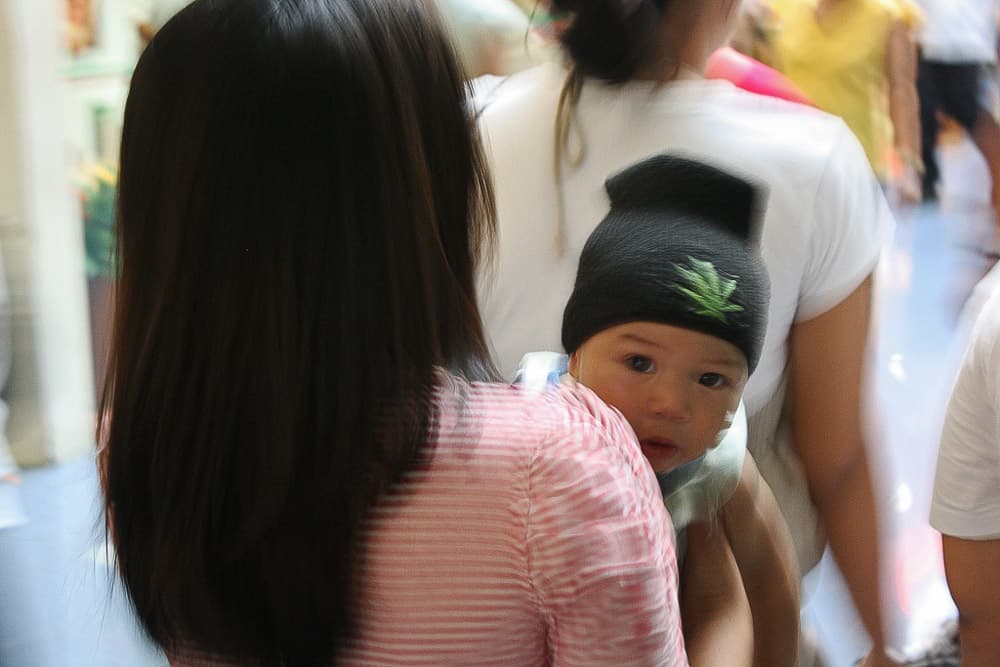
CBS 4 Denver recently made an alarming claim: “Colorado’s legalization of recreational marijuana has led to an increase in the number of babies being born THC-positive.”
A Pueblo hospital shared statistics with CBS 4 that indicated nearly half of babies born in one month tested positive for THC. St. Mary-Corwin Medical Center’s neonatal head reported a dramatic increase. The hospital is now among healthcare organizations supporting a recreational marijuana ban in Pueblo.
But what about hospitals here? In Denver the Department of Public Health does not track this type of data. And even if it did, it would be difficult to assess whether marijuana has much of an impact on a developing fetus or a breastfeeding infant.
Existing research is faulty because other factors -- like financial stability -- have a big effect on a child's development. Future research is complicated, too, because if marijuana is damaging, it would be difficult to justify studying its effects in babies.
Anecdotally, at least, healthcare providers and others who work with new mothers are reporting increases in babies born THC-positive. But these reports may point less toward increases in marijuana use during pregnancy and more toward increasingly rigorous screening tactics used on pregnant mothers since marijuana legalization.
Under Title 19 in the Colorado Revised Statutes, certain professionals -- including healthcare workers -- are "mandatory reporters" and are obligated under law to report to Child Welfare instances of suspected child abuse or neglect. Exposure to Schedule I and Schedule II drugs falls under this statute and marijuana remains a Schedule I drug.
With pregnancy, the issue becomes a bit more complicated.
When a mother comes in for prenatal consultation, she fills out paperwork. Included in this lengthy questionnaire are often questions about drug use, prescription or otherwise.
Denver Health and St. Joseph’s spokespeople confirmed that the screening contains a waiver that enables the provider to drug test a woman unannounced, and these waivers often apply to newborns, too. At Denver Health, perinatologist Dr. Torri Metz said the policy is to receive a mother's consent prior to testing. But if a mother tests positive for drugs, her baby will most likely be tested. And the consent in the waiver is enough to test with or without the mother's knowledge.
But before we get into the weeds about what can happen if a baby tests positive for, well, weed, let's talk about THC and health.
Research is more difficult to conduct on Schedule I drugs, such as marijuana. At this point, there is little concrete evidence that THC, the psychoactive component of marijuana, does harm to a developing fetus.
The state’s official stance on THC during pregnancy is that “there is no known safe amount of marijuana to use while pregnant. That's because no matter how it's used (smoked, eaten etc.), THC gets passed to your baby and may have a long-term impact on your child's ability to learn,” according to Good to Know Colorado.
In short, since not enough research has been done, there could be negative side effects. And it’s better to be safe than sorry.
“It’s hard for women to know what to do during pregnancy,” Metz said. “The information we do have is limited. We try to weigh risk and benefit. We worry there are risks, and we don’t know if there are benefits so we try to tell women to keep away from marijuana because it does cross the blood placenta barrier into the fetus.”
Metz is currently conducting research on the impact of THC on developing fetuses and infants, which she will be publishing soon. But it's difficult to research the effects of THC, she added, because it might be harmful. It wouldn't be ethical to ask pregnant women to sign up for a study where they are randomly assigned to use marijuana or not.
Heather Thompson is an applied molecular biologist at Mountain Midwifery Birth Center in Englewood. There she helps health providers and new families navigate the often complicated landscape of medical marijuana use during pregnancy. Her views are independent of Mountain Midwifery.
Thompson cited a 30-year longitudinal study of the effects of prenatal THC exposure in teenagers. Effects commonly associated with exposure were low birth weight, reduced attention span and neurological impairment, but Thompson believes these factors are as much a product of environment as drug exposure.
“The subjects involved in that long-term research were almost 70 percent African-American and more than 60 percent of them were single mothers living in poverty,” she said. “We know that being African-American increases your chance for having a low birth-weight baby and living in poverty absolutely produces those attention deficits we see in adolescents.”
Research on breastfeeding is even more limited.
There are three studies commonly referenced when searching for answers about the effects of THC during breastfeeding. A 1985 study identified no adverse effects to infants exposed to THC-positive breastmilk. A 1990 study suggested limited adverse effects--including reduced motor skills and slowed growth rate--that affected the baby at three months. Those effects were resolved within one year. The third study, also conducted in 1990, followed up with four-year-olds exposed to marijuana prenatally and after birth. The study demonstrated reduced verbal and memory skills measured through testing, but those findings, too, were reversed at five and six years old.
Thompson referenced several studies from Israel, Jamaica and Great Britain to reinforce her stance that THC in breast milk was not necessarily causing the developmental issues seen in other studies. A study conducted in 1994 in Jamaica demonstrated that babies exposed to THC during breastfeeding actually showed increased responsiveness, alertness and attachment. The women smoking and selling the most marijuana were also likely to have the most financial resources and have the most stable home lives.
Today's marijuana policy is based on a study from the 1980s that uses only two subjects.
Policy and clinical guidelines regarding marijuana use during pregnancy and breastfeeding predominantly comes from a 1982 letter to the editor in the New England Journal of Medicine. The study, which is not peer-reviewed, included two breastfeeding women and their babies. One woman smoked once per day and the other smoked up to seven times daily. The paper found that THC metabolites were passed through breast milk in the woman who smoked more.
Both babies were found to be in good health, but to this day, modern policy is based on that letter and the simple fact that the researcher found metabolites in breast milk.
If a baby tests positive for THC after birth, there will be consequences.
Due to Colorado’s mandatory reporting law, if a baby tests positive after birth for THC -- or any other Schedule I or II drug --healthcare providers are required to report the family to Denver Department of Human Resources Child Welfare.
Child Welfare Director Joe Homlar walked me through a hypothetical series of events following a positive drug test. The department considers drug exposure to be a potentially serious matter, so they always follow-up.
Once a family has been reported for suspected abuse and neglect, Child Welfare is required to make contact with the family, usually in the form of a face-to-face assessment. According to Homlar, the department does not keep specific data regarding marijuana-based assessments, but the department meets with between 4,000 and 4,500 families annually to evaluate them for abuse and/or drug exposure allegations.
“We want to be sure we can offer support and know what is going on in the lives of kids, and we want to make sure the families have the resources to keep the child safe,” he said.
Homlar said that after the initial evaluation, more aggressive action can be taken, including court supervision or even removal of a child from a home. This usually occurs if the family appears unwilling to change or to work together to support the child. Action only escalates in about 10 to 20 percent of total cases.
THC-positive drug tests are not usually enough to dictate further action, Homlar added. In many cases there are other factors, such as family violence or negligence that a caseworker may discover.
Child Welfare communications director Julie Smith said the department cannot say whether cases of THC-positive births are on the rise, since no marijuana-specific data collected. Any evidence would simply be anecdotal.
Child Welfare assessments carry their own consequences.
These initial assessments can be traumatic for new families, as well as damaging to some parents’ career prospects, according to Indra Lusero who works as a legal counselor at Elephant Circle, an affordable legal and educational resource for women in need.
Of the cases Lusero works with, about 10 percent escalate to further action from the initial consultation.
But just making a finding of abuse or neglect puts the parents’ names in a database that shows up in background checks, she said. If the parents work in childcare, their future job prospects and consequently financial stability could be threatened.
One possible outcome of Child Welfare intervention is that a mother will be ordered not to breastfeed if she continues using. Thompson -- the biologist -- emphasized that not breastfeeding could potentially be more dangerous to a child's health than the unknown effects of THC exposure.
So, are there really more babies being born THC-positive?
There is no data, at least in Denver, to suggest that THC-positive births are on the rise.
Metz from Denver Health said that, anecdotally, instances of self-reported marijuana use have increased since legalization.
“It is hard to know if that reflects increased use versus increased willingness to disclose,” she said. “We have looked at the urine toxicology screenings of pregnant women at the University of Colorado, and it has increased.”
Lusero said they receive calls about once a month from mothers around the country dealing with allegations of abuse and neglect stemming from marijuana use. Again -- anecdotally -- they said it seems these cases are increasing. But the providers they work with have said they are also increasing postpartum drug testing.
Until the state starts keeping uniform data on marijuana use in pregnant and breastfeeding mothers, the link between legalization and THC-positive births will remain anecdotal.
Multimedia business & healthcare reporter Chloe Aiello can be reached via email at [email protected] or twitter.com/chlobo_ilo.
Subscribe to Denverite’s newsletter here.












